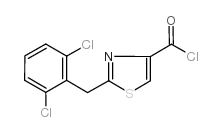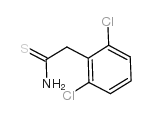263157-86-4
| 中文名 | 2-(2,6-二氯苄基)-1,3-噻唑-4-羰酰氯 |
|---|---|
| 英文名 | 2-[(2,6-dichlorophenyl)methyl]-1,3-thiazole-4-carbonyl chloride |
| 英文别名 |
2,6-DIMETHYL-4-MORPHOLINESULFONYL CHLORIDE
2-(2,6-Dichlorobenzyl)-1,3-Thiazole-4-Carbonyl Chloride |
| 密度 | 1.518g/cm3 |
|---|---|
| 沸点 | 422ºC at 760 mmHg |
| 熔点 | 104ºC |
| 分子式 | C11H6Cl3NOS |
| 分子量 | 306.59500 |
| 闪点 | 209ºC |
| 精确质量 | 304.92400 |
| PSA | 58.20000 |
| LogP | 4.41970 |
| 蒸汽压 | 2.5E-07mmHg at 25°C |
| 折射率 | 1.632 |
Synonym: Section 2 - COMPOSITION, INFORMATION ON INGREDIENTS
Risk Phrases: 34 Section 3 - HAZARDS IDENTIFICATION EMERGENCY OVERVIEW
Causes burns.Moisture sensitive. Potential Health Effects Eye: Causes eye burns. Skin: Causes skin burns. Ingestion: Causes gastrointestinal tract burns. Inhalation: Causes chemical burns to the respiratory tract. Chronic: Not available. Section 4 - FIRST AID MEASURES Eyes: Immediately flush eyes with plenty of water for at least 15 minutes, occasionally lifting the upper and lower eyelids. Get medical aid immediately. Skin: Get medical aid immediately. Immediately flush skin with plenty of water for at least 15 minutes while removing contaminated clothing and shoes. Ingestion: Do not induce vomiting. Get medical aid immediately. Inhalation: Get medical aid immediately. Remove from exposure and move to fresh air immediately. If not breathing, give artificial respiration. If breathing is difficult, give oxygen. Notes to Physician: Treat symptomatically and supportively. Section 5 - FIRE FIGHTING MEASURES General Information: As in any fire, wear a self-contained breathing apparatus in pressure-demand, MSHA/NIOSH (approved or equivalent), and full protective gear. Extinguishing Media: Use foam, dry chemical, or carbon dioxide. Section 6 - ACCIDENTAL RELEASE MEASURES General Information: Use proper personal protective equipment as indicated in Section 8. Spills/Leaks: Vacuum or sweep up material and place into a suitable disposal container. Section 7 - HANDLING and STORAGE Handling: Do not breathe dust, vapor, mist, or gas. Do not get in eyes, on skin, or on clothing. Use only in a chemical fume hood. Storage: Store in a cool, dry place. Store in a tightly closed container. Corrosives area. Store under an inert atmosphere. Section 8 - EXPOSURE CONTROLS, PERSONAL PROTECTION Engineering Controls: Facilities storing or utilizing this material should be equipped with an eyewash facility and a safety shower. Use adequate ventilation to keep airborne concentrations low. Exposure Limits CAS# 263157-86-4: Personal Protective Equipment Eyes: Not available. Skin: Wear appropriate protective gloves to prevent skin exposure. Clothing: Wear appropriate protective clothing to prevent skin exposure. Respirators: Follow the OSHA respirator regulations found in 29 CFR 1910.134 or European Standard EN 149. Use a NIOSH/MSHA or European Standard EN 149 approved respirator if exposure limits are exceeded or if irritation or other symptoms are experienced. Section 9 - PHYSICAL AND CHEMICAL PROPERTIES Physical State: Solid Color: off-white Odor: Not available. pH: Not available. Vapor Pressure: Not available. Viscosity: Not available. Boiling Point: Not available. Freezing/Melting Point: 100 - 103 deg C Autoignition Temperature: Not available. Flash Point: Not available. Explosion Limits, lower: Not available. Explosion Limits, upper: Not available. Decomposition Temperature: Solubility in water: Specific Gravity/Density: Molecular Formula: C11H6Cl3NOS Molecular Weight: 307 Section 10 - STABILITY AND REACTIVITY Chemical Stability: Not available. Conditions to Avoid: Incompatible materials, exposure to moist air or water. Incompatibilities with Other Materials: Bases, oxidizing agents, alcohols, amines. Hazardous Decomposition Products: Hydrogen chloride, chlorine, nitrogen oxides, carbon monoxide, oxides of sulfur, carbon dioxide. Hazardous Polymerization: Has not been reported Section 11 - TOXICOLOGICAL INFORMATION RTECS#: CAS# 263157-86-4 unlisted. LD50/LC50: Not available. Carcinogenicity: 2-(2,6-Dichlorobenzyl)-1,3-thiazole-4-carbonyl chloride - Not listed by ACGIH, IARC, or NTP. Section 12 - ECOLOGICAL INFORMATION Section 13 - DISPOSAL CONSIDERATIONS Dispose of in a manner consistent with federal, state, and local regulations. Section 14 - TRANSPORT INFORMATION IATA Shipping Name: CORROSIVE SOLID, ACIDIC, ORGANIC, N.O.S.* Hazard Class: 8 UN Number: 3261 Packing Group: III IMO Shipping Name: CORROSIVE SOLID, ACIDIC, ORGANIC, N.O.S. Hazard Class: 8 UN Number: 3261 Packing Group: III RID/ADR Shipping Name: CORROSIVE SOLID, ACIDIC, ORGANIC, N.O.S. Hazard Class: 8 UN Number: 3261 Packing group: III Section 15 - REGULATORY INFORMATION European/International Regulations European Labeling in Accordance with EC Directives Hazard Symbols: C Risk Phrases: R 34 Causes burns. Safety Phrases: S 26 In case of contact with eyes, rinse immediately with plenty of water and seek medical advice. S 36/37/39 Wear suitable protective clothing, gloves and eye/face protection. S 45 In case of accident or if you feel unwell, seek medical advice immediately (show the label where possible). WGK (Water Danger/Protection) CAS# 263157-86-4: No information available. Canada None of the chemicals in this product are listed on the DSL/NDSL list. CAS# 263157-86-4 is not listed on Canada's Ingredient Disclosure List. US FEDERAL TSCA CAS# 263157-86-4 is not listed on the TSCA inventory. It is for research and development use only. SECTION 16 - ADDITIONAL INFORMATION N/A |
| 危害码 (欧洲) | Xi |
|---|---|
| 风险声明 (欧洲) | R34 |
| 安全声明 (欧洲) | S26-S36/37/39-S45 |
| 危险品运输编码 | UN 3261 |
|
~% 
263157-86-4 |
| 文献:Amgen Inc. Patent: US2004/157845 A1, 2004 ; Location in patent: Page 21 ; US 20040157845 A1 |
|
~% 
263157-86-4 |
| 文献:Larsen, Scott D.; Stachew, Carl F.; Clare, Paula M.; Cubbage, Jerry W.; Leach, Karen L. Bioorganic and Medicinal Chemistry Letters, 2003 , vol. 13, # 20 p. 3491 - 3495 |
|
~% 
263157-86-4 |
| 文献:Larsen, Scott D.; Stachew, Carl F.; Clare, Paula M.; Cubbage, Jerry W.; Leach, Karen L. Bioorganic and Medicinal Chemistry Letters, 2003 , vol. 13, # 20 p. 3491 - 3495 |
| 上游产品 2 | |
|---|---|
| 下游产品 0 | |




